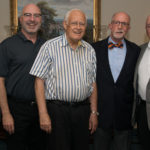Two brief words leaped up from the comments section of a news story posted on the Internet. They practically pulsed on my computer screen.
“God hopes … .”
Now, a few weeks later, I can’t remember what the commenter claimed God hopes. But the very idea of God hoping caught my spiritual imagination. Across decades of attempting to think systematically about God, I don’t recall envisioning God hoping.
 Editor Marv KnoxThat’s probably due to my solid traditional Baptist upbringing. Even when I was a little boy, my blue-collar Sunday school teachers taught me to believe in and rely on the infinity of God.
Editor Marv KnoxThat’s probably due to my solid traditional Baptist upbringing. Even when I was a little boy, my blue-collar Sunday school teachers taught me to believe in and rely on the infinity of God.
We grappled with long words to describe God’s qualities. We learned about the divine “omnis”: God is omnipotent, all-powerful; omniscient, all-knowing (particularly frightful to a teenage boy); and omnipresent, in all places at all times.
My eighth-grade teacher pronounced God “omni-everything,” which (a) pretty well seemed to sum up the conversation and (b) was easier to pronounce.
Even though we agreed God exercised self-limiting power to provide people the freedom to accept or reject salvation, we affirmed God’s omniscience means God already knows the outcome of all events. So, why would God need to hope?
Turns out, bloggers and website hosts like to discuss/debate the idea. If you want to find out for yourself, type “Does God hope?” or “God hopes” in practically any Internet search engine. You’ll see.
Open Theism
Sign up for our weekly edition and get all our headlines in your inbox on Thursdays
The poles of the debate have been staked out by the most fervent five-point Calvinists, or adherents of the Reformed tradition, on one end and Open Theists on the other.
The Reformed position affirms the absolute sovereignty of God, who preordained all things. God planned and directed everything that has happened and everything that will happen. Consequently, God doesn’t need to hope, since God controls the outcome. “God’s hope” is an oxymoron.
Open Theists claim God honors human free will, which means God limits God’s own power and control over details. So, while God knows all that can be known, details subject to human decisions and actions simply cannot be known; to know them would be to determine them. But God can hope for the outcomes.
Arguments between Reformed adherents and Open Theists rank among the most heated in Christendom. In large measure, that’s because both sides take Scripture—which is stubbornly paradoxical—seriously.
Different focal scriptures
The Reformed focus on passages that proclaim God’s sovereignty. Any interpretations that might diminish God’s power and grace and glory diminish God. So, all other aspects of theology and understanding of how the world works—such as human free will, or sin, or the nature of evil—must be understood in light of God’s sovereignty.
Open Theists take other passages literally. They point to Scripture that says God “changed his mind” or God “relented.” They cite passages where Jesus says “whosoever will” may accept salvation. They emphasize verses that indicate people possess authority and responsibility for actions, which seem to occur independently of God’s direction.
Strong’s Exhaustive Concordance lists 128 uses of the word “hope” in the Bible. Of those, 59 appear in the New Testament. The word translated “hope” in the New Testament comes from the Greek word elpis, which means to anticipate, expectation or confidence.
None of the verses seems to indicate God hopes. The closest interpretation requires building a bridge between two verses: “God is love” (John 14:6b) and love “bears all things, believes all things, hopes all things, endures all things” (1 Corinthians 13:7).
In God, hope abounds
That syllogism—God is love; love hopes; God hopes—seems to be a stretch. But it gets to the clear message of Scripture: God is the source of hope; in God—Father, Son and Holy Spirit—hope abounds.
• “Now may the God of hope fill you with all joy and peace in believing, so that you will abound in hope by the power of the Holy Spirit” (Romans 15:13).
• “I pray that the eyes of your heart may be enlightened, so that you will know what is the hope of his calling, what are the riches of the glory of his inheritance in the saints, and what is the surpassing greatness of his power toward us who believe” (Ephesians 1:18-19).
• “… God willed to make known what is the riches of the glory of this mystery among the Gentiles, which is Christ in you, the hope of glory” (Colossians 1:17).
• “Paul, an apostle of Christ Jesus according to the commandment of God our Savior, and of Christ Jesus, who is our hope” (1 Timothy 1:1).
• “This hope we have as an anchor of the soul, a hope both sure and steadfast and one which enters within the veil, where Jesus has entered as a forerunner for us …” (Hebrews 6:19-20).
• “Blessed be the God and Father of our Lord Jesus Christ, who according to his great mercy has caused us to be born again to a living hope through the resurrection of Jesus Christ from the dead” (1 Peter 1:3).
The prodigal son
Although we cannot comprehend how God views time, God placed us in a universe of forward-moving linear chronology. God provided people with an opportunity to form a loving relationship through the atoning sacrifice of Jesus, who told us God desires we embrace that relationship.
Jesus compared God’s relationship with human beings to a father’s relationship to a prodigal child. The father continually looked down the road, longing for the child’s return. Seeing the form of the child walking up the road, the father ran to embrace him and welcome him back to the family.
Based upon the Parable of the Prodigal Son, I believe God hopes for our salvation the way Strong’s defines elpis: “to anticipate … with pleasure.”















We seek to connect God’s story and God’s people around the world. To learn more about God’s story, click here.
Send comments and feedback to Eric Black, our editor. For comments to be published, please specify “letter to the editor.” Maximum length for publication is 300 words.